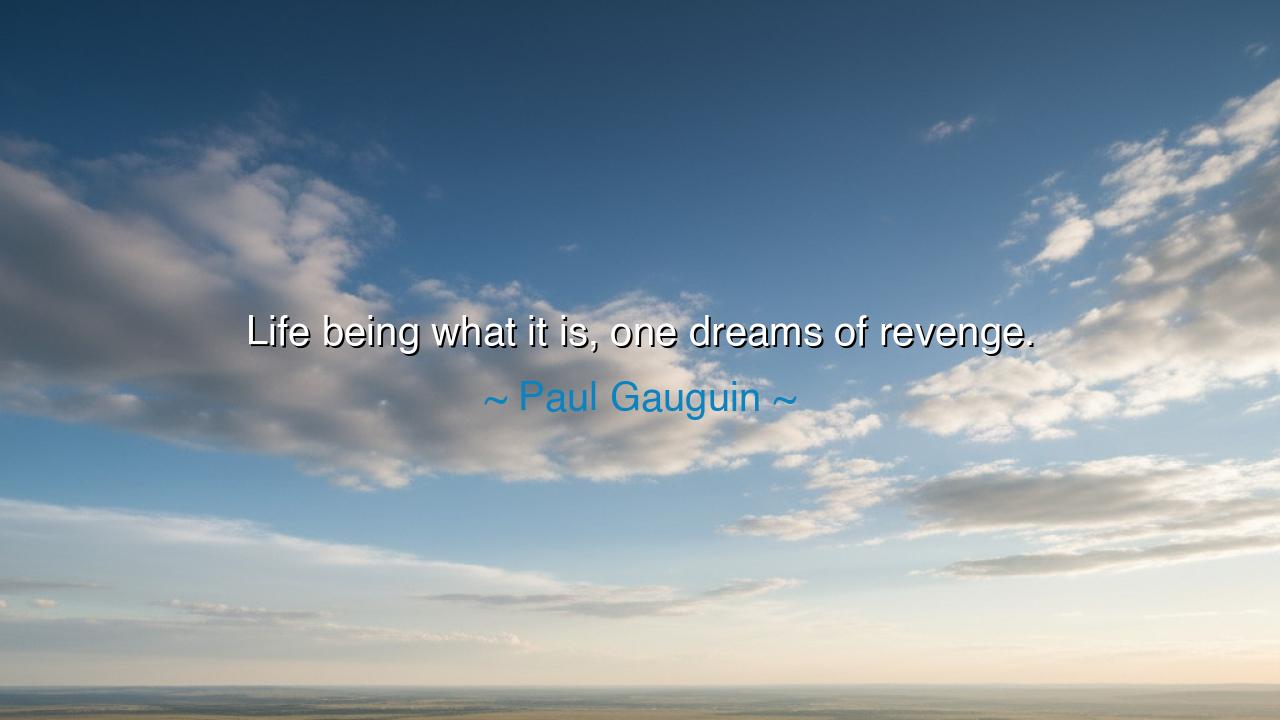
Life being what it is, one dreams of revenge.






The words of Paul Gauguin — “Life being what it is, one dreams of revenge.” — rise from the depths of the human soul like a confession carved into stone. They are not the boast of a violent heart, but the lament of a wounded one. In this line, Gauguin reveals the raw truth that life, with all its disappointments, injustices, and betrayals, often awakens in us the dark longing to strike back, to reclaim by force what the world has stolen by cruelty. Yet hidden within this confession lies a reflection as old as mankind: the eternal battle between the heart’s pain and the spirit’s wisdom — between vengeance and transcendence.
Gauguin, the great post-Impressionist painter, knew suffering intimately. He abandoned wealth, family, and comfort to chase his vision of artistic purity, only to find rejection, poverty, and misunderstanding at every turn. His art was mocked, his genius unrecognized, his spirit exiled from the world he tried to illuminate. Thus, when he wrote of revenge, it was not the revenge of blood, but of vindication — the artist’s dream to triumph through his creations, to let time prove the worth that his generation refused to see. His revenge was not destruction, but revelation. And yet, even this noble dream was born from pain, the same pain that visits every soul who dares to live deeply.
For truly, life being what it is, it will wound even the righteous. The innocent will be betrayed, the kind will be mocked, and the pure of heart will taste bitterness. This has been the story of every age. Consider Joan of Arc, burned at the stake by those she served. Her faith led her to victory, yet envy and politics led her to death. Did she not, in her final hours, feel the pang of that same human wish — that justice should fall upon those who wronged her? Yet history became her avenger. The flames that consumed her body became the fire that purified her name. Her revenge was not by sword, but by remembrance — a triumph granted by truth itself.
To dream of revenge, then, is not always evil. It is the first cry of the wounded spirit demanding that the world be made right. It is the desire for balance when the scales of justice tilt toward cruelty. But the ancients taught: “He who drinks vengeance sips from a poisoned cup.” For revenge binds the heart to suffering; it feeds on the past and blinds the soul to the dawn. The wise man, while he may feel the fire of anger, learns to transform it into creation, to turn the wound into wisdom and the defeat into destiny. Gauguin himself painted his agony into color — transforming despair into beauty, and vengeance into art.
There is, in truth, a higher revenge — not to destroy one’s enemies, but to outlast them; not to answer hatred with hatred, but to live so greatly that bitterness dies of insignificance. The poet who is scorned may write verses that outlive kings. The betrayed lover may build a life so radiant that betrayal fades like a shadow at sunrise. History itself teaches that the truest revenge is not in the act of retribution, but in the act of rising — of proving that suffering cannot break the spirit that endures.
Yet one must not despise the feeling itself. The urge for revenge is proof that the soul still cares, that it has not gone numb beneath the weight of injustice. To feel anger is human; to refine it into purpose is divine. The key is mastery — to let the flame warm you, not consume you. Let your revenge be excellence, your answer be endurance, your weapon be dignity. In this way, one conquers not only the world’s cruelty, but one’s own.
And so, O seeker of truth, remember: life being what it is, you will be wronged. You will taste bitterness, betrayal, and defeat. But when the dream of revenge rises within you, do not cast it away in shame — reshape it. Let it become the forge that tempers your will. Create instead of destroy. Build instead of burn. Shine instead of curse. For in doing so, you shall achieve the highest vengeance of all — the victory of the soul over suffering, and the triumph of creation over cruelty.






AAdministratorAdministrator
Welcome, honored guests. Please leave a comment, we will respond soon